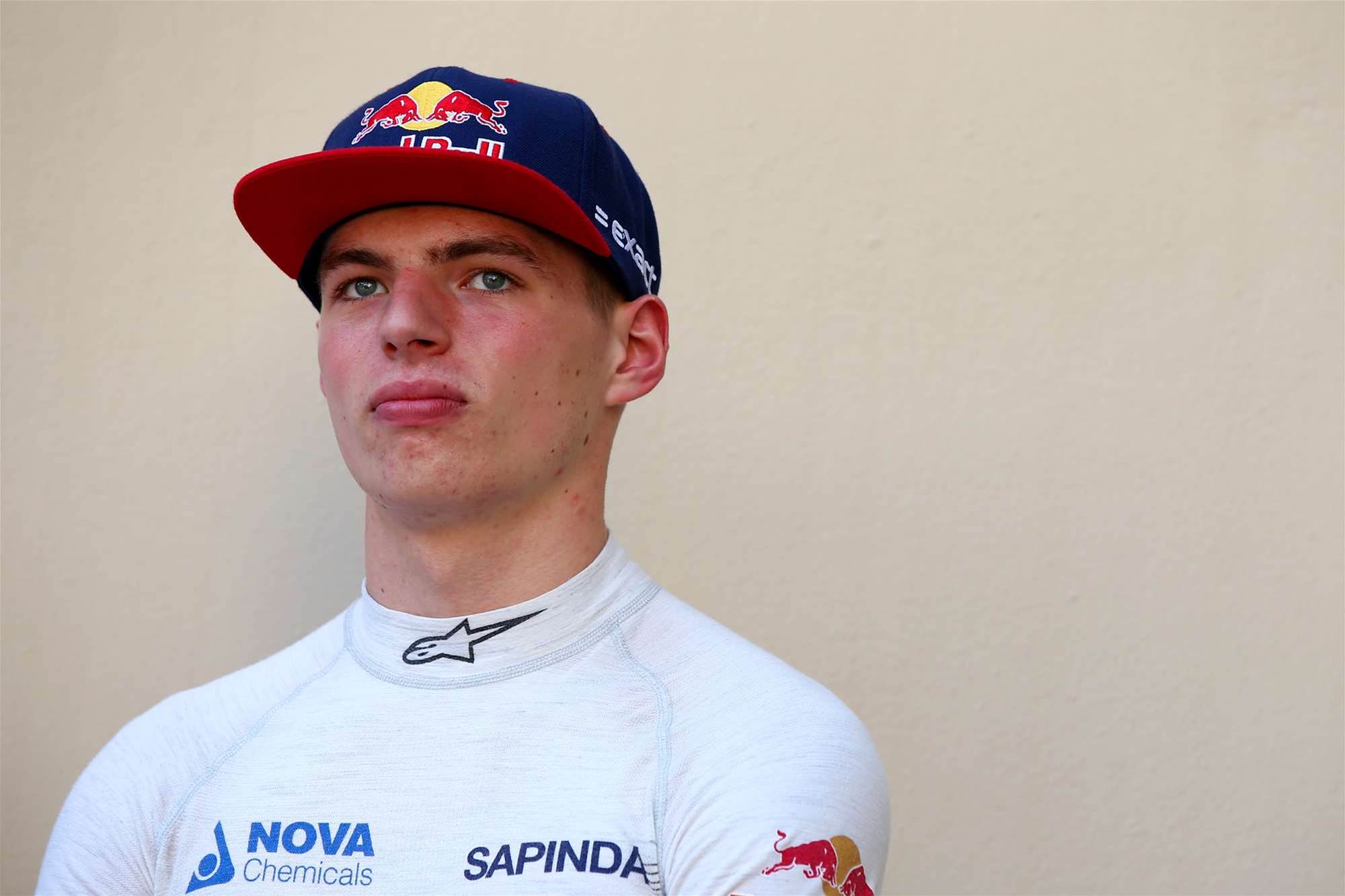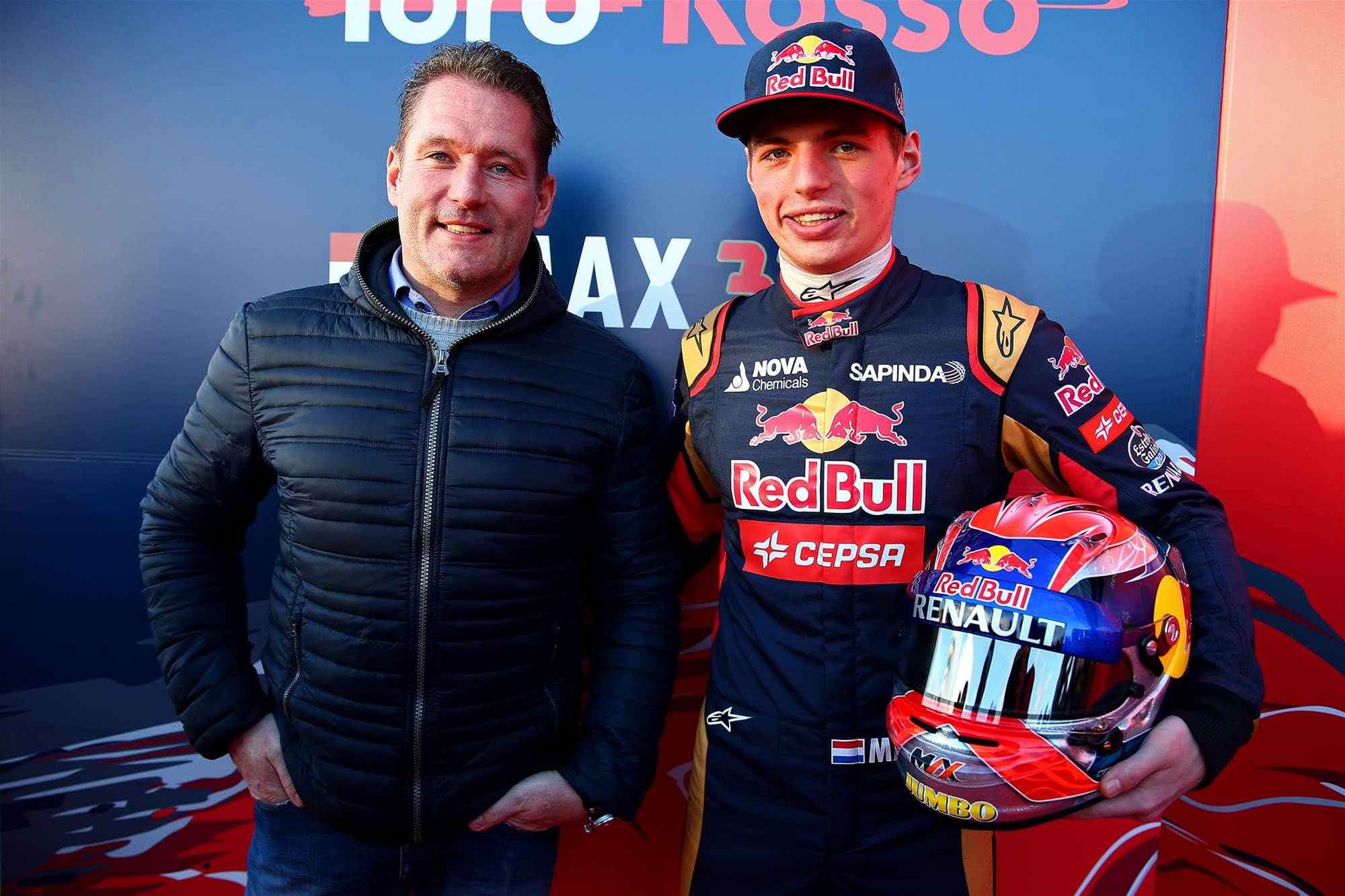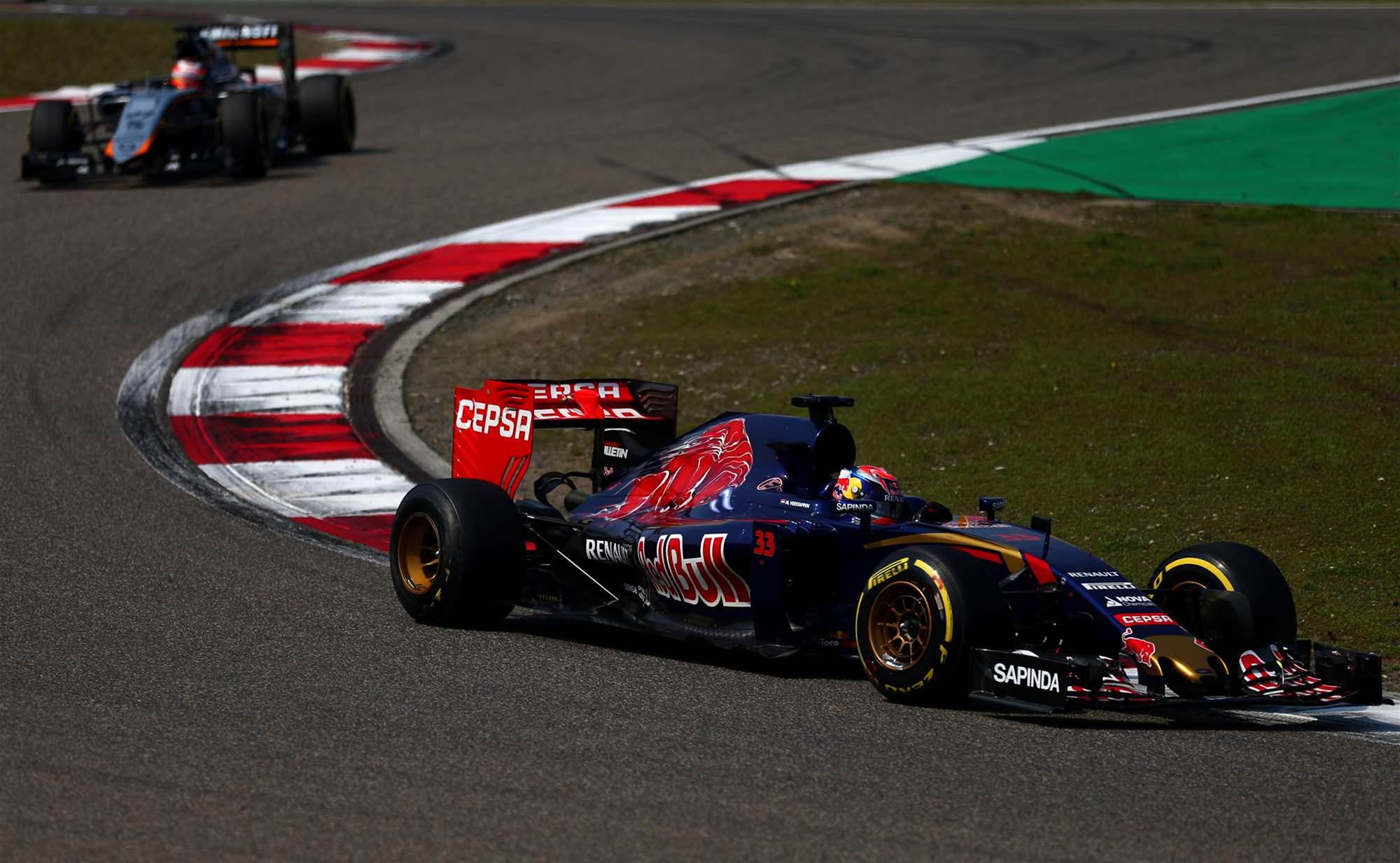He’s young, he’s quick, and his uncompromising style is winning him plenty of fans, if not many friends among his fellow drivers. To some, Max Verstappen is the best thing to happen to F1 in years. To others, his aggressive antics are troubling. Like any F1 rookie he lacks maturity, but could it actually be that he arrived in F1 too young and too inexperienced?
No one wins a Formula 1 grand prix by accident. It is a measure of this that those that score that breakthrough first F1 win early in their careers almost invariably go on to become greats of the sport. The top 10 youngest GP winners of all time include current stars Sebastian Vettel, Fernando Alonso, Lewis Hamilton and Kimi Raikkonen, as well as Bruce McLaren and Michael Schumacher. No journeymen or Bradburys among that lot.
But this year they were usurped by the latest youngest F1 GP winner.
When Vettel won at Monza eight years ago, he undercut previous youngest Alonso by an impressive almost 11 months. But in Spain this year, Max Verstappen obliterated Vettel’s record by some two-and-a-half years…
Like Vettel in 2008, Verstappen in 2016 does look to be the real deal. But has he arrived prematurely? Should he really have been allowed to make his F1 debut at such a young age, and with so little actual car racing experience?

If the FIA had its time back, Verstappen probably would still have been in F3 last year, or might have graduated to GP2. It’s quite clear that, in hindsight, the governing body thinks it shouldn't have granted an F1 superlicence to young Verstappen before he was old enough even to hold a driver’s licence in the Netherlands.
In late 2014, no real laws existed to prevent Toro Rosso from signing a 17-year-old. But now there are. Last year the FIA made sweeping changes to the superlicence system, establishing a minimum F1 age of 18 and a complex points system of mandatory junior category achievements.
So, just as Formula 1 has never seen anything quite like Max Verstappen, the FIA has moved to ensure we’re not going to see his like again (except, perhaps, if Williams signs Lance Stroll for 2017, but that’s another story).
Irrespective of Verstappen’s merits as a driver, the tightening of the superlicence rules has been a positive step for F1. Because it’s just not a good look for the supposed pinnacle of motor racing to have drivers this young. It invites the casual observer (or anyone, really) to conclude that if a teenager barely (or event not) old enough to hold a civilian driver’s licence can do it, then being an F1 driver surely can't be that big a deal. Formula 1 by definition should be very difficult – or, at the very least, it should be perceived as such.
As for young Max, he is certainly some kind of phenomenon. It’s not just that he’s the youngest-ever F1 driver and the youngest-ever grand prix winner (and that victory in Spain was as cool and as mature a display as you’ll ever see – it is just so hard sometimes to believe that the kid is as young as he is). It’s that he seems to have arrived at the highest level of the sport as a ready-made champion, at the age of 18 (make that under 18 in his debut season). He’s been very aggressive, yes, (we’ll get to that) but in one-and-a-half seasons he’s made far fewer rookie errors than might have been expected (Romain Grosjean comes to mind) from someone of his age and experience.
Even more impressive is his composure: he seems to be not overawed one bit by reputation or occasion. In fact, what he’s shown so far amounts to the template for an all-time great. That is how Max Verstappen is being widely perceived already – if he is this good at 18, how many records is he going to break over what potentially could be some 20 more years in F1?
If Max is still in F1 20-odd years down the track, most of the other current drivers will have long retired from the sport. And Kimi Raikkonen, an all-too-frequent sparring partner of Max’s this year, will be on the cusp of actual retirement age.

Some may point to the 18-year age difference between Max and Kimi as a mitigating factor in their fiery exchanges during the recent Belgian Grand Prix (not only is Kimi old enough to be Max’s father, he also raced against Max’s father…). Others think that Max was recklessly aggressive in defending his position, and was lucky not to have been penalised. What Kimi thought, we’ll not repeat here.
Verstappen was ‘counselled’ over how he dealt with Raikkonen at Spa when the Ferrari driver tried to overtake the Red Bull on Kemmel Straight. But that is all. No rules broken, according to race director Charlie Whiting. He described it as ‘just a move that was on the edge of being acceptable, but just the right side of it’.
Perhaps, but there is an unwritten code of conduct among drivers: the kinds of driving behaviour and tactics that they themselves think is and isn’t fair game. This itself is a little bit contested, but it’s reasonably straightforward when it comes to situations such as the Max/Kimi Kemmel Straight affair. And it is this: on any long straight section of road, well before the next braking area and well past the previous corner, a driver should be entitled to a reasonable opportunity to overtake another driver without the risk of being forced off the road. At more than 300km/h, in this case.
It doesn’t take skill for a racing driver to block a challenger at high speed on a straight. All it requires is enough arrogance and self-belief, combined perhaps with a lack of awareness of the consequences and a deluded sense of invincibility. The kinds of qualities commonly seen in teenage boys.
It’s also the kind of thing you see plenty of in the junior categories. But by the time most young drivers have made the step up to the big time, they’ve learned to erase this kind of crazy-aggression from their racecraft repertoire.
Watching Max wait for Kimi to make his move on Kemmel Straight before darting to the right to block the Ferrari – effectively offering Raikkonen the option of either braking or crashing into the rear of Max’s car – was all-too reminiscent of the kinds of crude antics you typically see in junior categories such as Formula Ford.

Not that Max himself ever raced a Formula Ford. Before F1, he hadn’t done very much car racing at all. Sure, he wasn’t even five when he started racing karts, but Verstappen’s first experience in an actual racing car was as recent as October, 2013, in a test day in a Formula Renault. Less than 12 months later, he would be lining up in an F1 Toro Rosso at Suzuka in Friday free practice ahead of the Japanese Grand Prix. He had turned 17 just four days earlier…
Perhaps an entire childhood spent karting is enough these days to prepare a driver for the top echelons of the sport. Indeed, it’s not the first time a driver has made it to F1 with a bare minimum of car racing experience (but many years of karting). No less than Raikkonen himself is a shining case in point.
While Verstappen’s pre-F1 car racing experience amounted to just the one season in F3, Raikkonen famously made it to F1 after just two years in Formula Renault. But when Kimi took his place on the grid at Albert Park in 2001, he was no raw 17 year-old teen, having at least reached the status of adulthood for his GP debut, at the ripe old age of 21…
For good and bad, Verstappen is right now the centre of attention in F1. Many see him as a refreshing change from what they perceive as cosy club of older F1 stars more inclined to err on the side of caution.
For some, even some past drivers (and, notably, Bernie Ecclestone), Max is doing nothing more than simply racing hard – and he should not be restrained. That was Johnny Herbert’s view of the Spa incident. Herbert more or less dismissed it as hard but fair. One wonders what might he have thought of it had he still been racing, and had been in Raikkonen’s shoes…
It’s as though the cheer squad for Max almost sees him as the (rare) embodiment of a ‘pure’ racer – the idea of a driver not only possessed of peerless speed but one who is also a fearless combatant, ready and willing to risk all to take what should rightfully be theirs.
One former F1 great who might have been expected to be in the Max camp is Jacques Villeneuve. After all, the 1997 world champion was a pretty robust competitor in his day, and as an observer on the sidelines these days thinks the cars and tracks have become almost too safe, and the drivers ‘earn millions but are cowards hiding behind a safety car’.
As ever, the forthright Canadian did not mince words when giving his view of Max’s driving. “Twenty years ago someone would have put him in a tree,” Villeneuve told motorsport.com. He also offered Max this piece of brutally frank advice: “Just calm down. You're going to kill someone.”
Martin Brundle described the outcome of the Spa post-mortem as an unequivocal victory for Verstappen. In a way, Max had called their bluff. As far as he was concerned, he hadn't broken any actual rules, he had always raced this way and frankly was not too bothered if anyone had a problem with it. Notwithstanding Charlie Whiting’s post-Spa chat with Verstappen, it seems the authorities indeed do not have a problem with it.
Brundle knows himself all about the kind of brutal single-mindedness we’re seeing from Max. He experienced it first hand in Ayrton Senna (they were fierce rivals in F3) and Michael Schumacher (team-mates at Benetton in the mid-90s).
Senna and Schumacher will forever be remembered for their sheer uncompromising commitment as much as their speed: complete racers. But, great champions though they were, they weren't without their flaws.
Both of them were possessed of a soaring sense of self-belief that bordered on arrogance. Neither Senna nor Schumacher was too fussed about complying with the rules if it meant being beaten – that by mere virtue of their superiority, it was almost as if they were entitled to win, regardless of the cost.
But Senna and, to a lesser extent, Schumacher, were of a different era. The kind of brutal tactics those two sometimes employed to bully their opponents into submission aren't tolerated in today’s F1. We saw this in Schumacher’s comeback – in his pre-2007 career he’d probably have gotten away with squeezing Rubens Barrichello up against the pit wall on the straight at the Hungaroring; not in 2010, however.
The fact that Verstappen so far is (mostly) getting away with these kinds of Schumacher/Senna-esque moves has lead some, including Villeneuve, to even suggest that the FIA is ‘protecting’ Max, simply because the F1 Wunderkind is good for business (the massive turnouts at Hockenheim and Spa were largely attributed to the Max factor). It’s an interesting theory, if probably a reach too far towards the realm of conspiracy theories; more likely it’s simply that the regulators haven't been tested in the way Max is testing them since, well, Schumacher.
He certainly is testing them. He is even prompting them to rewrite the rules: in the aftermath of Max’s blocking tactics on Lewis Hamilton in Japan (Max waited for Lewis to first commit to an inside braking move into the chicane before jinking into the space the Merc was aimed at – giving Lewis the option of crashing into the Red Bull or heading down the escape road) Whiting tweak the wording of the overtaking regs.

Max right now is displaying plenty of Schumacher/Senna qualities. It’s early days but what we may be witnessing here are the beginnings of an F1 star of the stature of those two greats. With potentially so many years ahead of him in F1, he could go on to rival or even surpass the likes of Senna and Schumacher.
If so, it will be up to him as to whether he’ll also been known as a driver for whom fair play was optional, or was something that only applied to other drivers.
This is a pivotal time in young Max’s career. It could be that what we are seeing from Verstappen now is exactly the same as what will get into the future. Or perhaps Max might pause to reflect on the criticism that’s been levelled at him and take the remaining races in 2016 as an opportunity to learn some of the things he never had the opportunity to learn in his brief spell in the junior categories.
Related Articles

Norris tops day one in Bahrain as Red Bull’s straight-line edge draws attention

Gallery: McLaren MCL40






.png&h=115&w=225&c=1&s=1)
.jpg&h=115&w=225&c=1&s=1)





